|
Here's some "colorful" music: tweaked scores of The Unsinkable Molly Brown and 13 (music and lyrics by Jason Robert Brown), and the concept recording for Anne of Green Gables, plus vocals by Carol Lipnik and Jasper Kump.
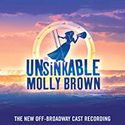 THE UNSINKABLE MOLLY BROWN THE UNSINKABLE MOLLY BROWN
THE NEW OFF-BROADWAY CAST RECORDING
Broadway Records/ Yellow Sound Label
Digital
Once upon a time, the original runs of two big, bustling musicals with scores by Meredith Willson overlapped, playing several blocks apart on Broadway. They've had different afterlives. The Unsinkable Molly Brown, sailing into the Winter Garden Theatre in 1960, never found its way back to the Great White Way, while the more-awarded The Music Man has had revivals, the latest now settled in at the Winter Garden. Another overlap is that a melody cut from that bigger hit has found its way into a very revised version of Molly as a dance number, with a new lyric and title ("If We Can-Can"). The old musical about the real-life Mrs. Brown–social activist, survivor of the Titanic, union organizer for mine workers–was reworked by Dick Scanlan, who did his own mining through the Willson archives of songs. A major mission of rescuing, revamping, and retrofitting some music with new lyrics of his own or adding to the original words has resulted in a high-spirited hybrid of a score. (And that surgery is almost modest, compared to his overhaul of the book, to throw overboard much of the highly fictionalized biographical details to bring the story closer to the truth. But, since there isn't much dialogue included on the recording with the Off-Broadway cast, that isn't our concern here.)
Purists who might be mega-fans of the original version may bemoan those songs that have been cut or changed here, and some musical theatre folks are just on principle generally revival-resistant. I get that, but my rebuttal is that making a bio-musical more accurate is a more admirable goal than the aims of more typical surgery for perceived marketability that just dumbs things down, gloms on woke and contemporary messages, or shoe-horns famous hit songs or re-styles the music as pop/rock du jour. That the new book and its altered subjects of emphasis motivated a harvest of splendid, catchy Meredith Willson material we probably would never otherwise hear is more than ample reason to compensate and celebrate. Oh, not so incidentally, the Scanlan words are very worthy and colorful. All the lyrics are in the digital booklet which also has background information, full credits, and color photos of the Transport Group's production.
Beth Malone is a terrific Molly, landing the songs and character with verve, grit and gutsiness galore. It's not just the requisite determined optimism; the scrappy persona also has humor and sincerity. Articulating philosophy that advocates the fortunate helping the needy is crystallized with the impactful, pithy "Share the Luck," invoking the Golden Rule. It was born as a kind of encouraging-push public service message Willson wrote to support the Red Cross.
The memorably boisterous numbers from the 1960 show are in place and have the needed kick: Molly's declaration of pluck, "I Ain't Down Yet"; and the drinking invitation she leads, "Belly Up to the Bar, Boys" (although it could use a bit more rowdiness from the chorus). A new tack on describing imbibing, "Cuppa Tea" has the merry, meritorious Malone leading the way with Scanlan's words fit to a Molly melody that was cut (then called "Dignity"). Here's a taste of the reflection: "Quite a race that I ran/ Victory begins with where I began/ Not to say I'll return one day/ I prefer it here with my souvenir/Of another cuppa tea to humble me once more."
Chorus work is tight and lively, although most members of the cast don't get meaty moments to shine on their own. However, leading man David Aron Damane boasts a rich, resonant sound, flattering the original score's standout ballad, "I'll Never Say No" and partnering well with our star to spar on their cutely ornery "I'd Like to Change Everything About You." (Scanlan's words on that one include "I'd temper your fiery, Irish temperament/ Lower the flame till I hear Yes, dear'/ I'd like to change everything about you/ Without changing your love for me.")
The conductor, Joey Chancey, and orchestrations by Larry Hochman, with additional ones by Michael Starobin and Bruce Coughlin, make the nine-member band and songs all sound wonderful and fresh. What a mighty mix of old and new: a patchwork with seams that don't seem to show!
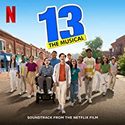 13: THE MUSICAL 13: THE MUSICAL
FILM SOUNDTRACK
Ghostlight Records/ Atlantic Records
Digital
Time flies. 13: The Musical of stage origins, centered on a boy turning 13, is itself more than 13 years old, now reborn as a movie (and, thus a soundtrack recording). Most of it bubbles and bristles with honed good spirits and some tame taunts, thanks to Jason Robert Brown's songs that are non-condescending to the never-ending doubts, desires and delights of its characters. This new crop of appropriately short-in-the-tooth singing actors portraying the middle school schoolmates ably delivers the angst and frustration and the rest of the restlessness. There's not much edge or irony in the mix, with despair in spare supply; even sad and angry moments feel more polished and almost cutely controlled. But froth can be fine.
Unlike some cast recordings with adolescent and teen voices, this one won't make your ears or gums sore with an onslaught of screechy, whiny or nasal voices. The vocals are vibrant and energy is often high (or should I say "junior high"), but it's pleasingly musical and explosions are, if not calibrated, at least justifiable. Mr. Brown, involved as one of five executive producers of the movie, worked on the vocal arrangements.
Recordings of 13's score vary in contents. Starting with the documentation of the demo and stage production recordings (there's also one in German), songs have come and gone and returned, been tweaked, and moved around. While the original theatre cast and orchestra were conceived as adults-free populations, the dramatis personae for the film has added grown-ups with some established actors. But the only one who gets to sing (and just once) is Debra Messing, playing the mother of protagonist Evan (the natural-sounding and sympathetic Eli Golden). They both do well with a new, nicely low-key number in which each laments current woes, glumly and bluntly observing that "It Would Be Funny' if it didn't suck."
Many songs involve a big bunch of kids singing together, echoing sentiments or egging each other on as the passion and music build. The large-scale ensemble addition called "I've Been Waiting" sums up summer's pent-up frustrations as students get back to their friends and potential sweethearts (oh, yeah, and also back to school). It's a mix of coy and joy in the traditional musical comedy conceit where dozens of people burst into song and all express the same thought in the same words (and in Netflix's visual, unison precise choreography).
Jonathan Lengel has the now-truncated role of Archie, but nevertheless makes the character matter. (In "Getting Ready," heard in a shorter and extended version, there is the tiny but notable lyric adjustment in making 13 less gutsy, with Archie's self-description of "sex god" changed to "love god.") Especially affecting are the solo spots for Gabriella Uhl as Evan's neighbor in his new town, acting as tour guide to point out the points of interest (or lack thereof) in the "Lamest Place in the World" and the food-for-thought values message about "What It Means to Be a Friend." She brings sobered emotion there, and in her part of "Tell Her," an effective, efficient multi-character piece that ties up the plot to bring on advice and apologies with specifics There's a worthy and warm solo version of it as a bonus track, voiced by pop singer Alec Benjamin. This shorter, gentle take captures the essence persuasively, generalizing the lyric so it can also work out of context.
While this 13 may rely rather heavily on pep and pop to give us a more drama-drained view of early teen troubles, there are satisfactions to savor when staying on the light side and the bright side for a while.
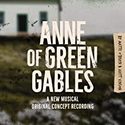 ANNE OF GREEN GABLES ANNE OF GREEN GABLES
A NEW MUSICAL
ORIGINAL CONCEPT RECORDING
Broadway Records
Digital
While I wonder how that very feisty favorite title character from children's literature, Anne of Green Gables, would view and cope with today's dreadful pandemic, I know it caused challenges, stops, starts and re-starts for its most recent musical adaptation before it materialized on stage and as some kind of audio presentation. Now playing, at last, at the Goodspeed Opera House in Connecticut, an attention-grabbing recording of some of the impassioned numbers comes to our renewed attention. We do get a tempting taste of the tone and piece, although we only get nine tracks from the contemporary-sounding score by Matt Vinson (music) and Matte O'Brien (lyrics, as well as book), and most are not sung by the Goodspeed cast members. But we do hear powerfully sung numbers by three women in the current company.
Several singers with Broadway credits are present to fine advantage in the "studio cast" category here. But first let's consider those three on the recording who are also presently on stage at Goodspeed. A strong personality (that's our plucky Anne, the orphan starting life in a new place with new people) gets a strong singing voice with Juliette Redden, a formidable belter, an adult not seemingly being asked to sound the age of the girl who ages from 11 to 16 in the action. The number that unapologetically celebrates her claim as a "Different Kind of Girl" receives two different treatments: one as her solo and the other in tandem with well-matched castmate Michelle Veintimilla portraying Anne's admired friend Diana. Aurelia Williams is in the show as an adult neighbor and she makes the most of her part of the advice-giving "Make a Move," which she shares with non-cast member Emily Bautista. There's no shortage of big, big voices on this sizzling sampler, as the aforementioned cuts show. Accompaniment on those pieces is throbbing and propulsive, like riding on a roller coaster or sled where the inclines increase as does the speed, with things hurtling toward climactic endings.
However, not everything is aggressive or seeking to rock the house and raise its roof. Other tones are engaging without the push and pow. "Easy," sung by George Salazar, is frolicsome, a rather irresistible parading of self-confidence that convinces. On the truly vulnerable front, "I Wanna Know You" is a romantic ride crooned in a marvelously melting manner by Chris McCarrell. He also has effective duets with Diana DeGarmo. And emotion swirls on "Oh, My Diana," led by two more reliable Broadway pros: Colin Donnell and Patti Murin.
It's intriguing to explore the varied vast volume of adaptations of the novel (and its sequels). In my years with my ears on cast recordings for this column, it's the third Anne project I've covered, and there have been others in earlier decades. You don't necessarily need to know the plot and themes to enjoy the concept recording, although it helps. It's kind of frustrating to only have a part of the score and for performers to share a role. I hope there will be a proper full-length follow-up. To quote another titular orphan from another novel that also spawned a musical, "Please, sir, I want some more."
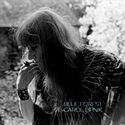 CAROL LIPNIK CAROL LIPNIK
BLUE FOREST
Mermaid Alley
CD, Digital
With her large vocal range, ethereal vocal quality, and disarming manner delivering poetic and confessional lyrics, singer Carol Lipnik is divinely, startlingly hypnotic. That may sound like hyperbole, but clear your head and take a listen. She pulls you in.
Blue Forest, like her other releases, is decidedly non-commercial and demands to be taken (and taken to heart) on its own terms. A gossamer quality and fragile persona co-exist with strong feelings boldly presented. Carol Lipnik takes her time, and often that means key statements in lyrics reappear–either re-inserted/re-asserted, sprinkled throughout a song, or repeated a few times in a row. In "All the Colors of the Sky" it's the latter pattern, intoning the phrase that includes that title followed by "in the eye of a dragonfly" and the haunting question "Will we miss it when it's gone?" Generally, the intensity and projected determination prevent things from feeling self-indulgent, didactic, or like a needle stuck on a damaged groove of an old vinyl record. Quite the opposite–to extend the simile, she gets in a groove a listener may want to linger in.
Does the characteristic M.O. of oft-repeated lines, being intense, daring to chide someone or something she's addressing risk being too much of a formula bringing diminishing returns? No, it doesn't risk overstaying the welcome with only seven tracks on this EP, some of which are quite short, clocking in at under three minutes. And it's not all heavy or hand-wringing unburdening of sorrows. Blue Forest is not about an unrelenting case of the blues. "Birds of a Feather," perhaps the most accessible of the lot, has a lot of serenity in it, and sly humor is evident in "I Don't Work Hard," a charming reflection about trying (or not) "to be likable." No worries; Carol Lipnik is more than likable. She's potentially addictive. And she can be seen in person at Pangea, the downtown Manhattan venue on September 18.
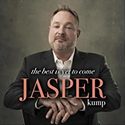 JASPER KUMP JASPER KUMP
THE BEST IS YET TO COME
Spikeup Music
Digital
Good things come to we who wait. In the very first year of my long tenure here, writing about CDs and New York City cabaret, I remember being struck by the chemistry between debuting singer Jasper Kump and veteran pianist/musical director Russ Kassoff on disc (Sunday in New York) and on stage. It's taken 17 years (!) for that exact lightning to strike again with Mr. K. and Mr. K., but patience is rewarded–they're together again with a digital release titled after one of its set of six songs, The Best Is Yet to Come, and a live gig that is yet to come–on August 25 at The Green Room 42 in midtown Manhattan.
Some time ago, the engaging visiting vocalist moved (back) to the West coast and has been working there as a clinical social worker. And you might, as I do, detect that profession's needed qualities of soothing supportiveness and insight in the way he handles the more serious songs. Or maybe I'm just taken in by his calm, warm phrasing and the gravitas and grace of "Here's to Life" and the other swaths of sincerity enhanced by the Kassoff caresses of melodies. But I stand by my theory (or wishful thinking). The strongest evidence comes with the empathy emphasized in "You Will Be Found" (from Dear Evan Hansen)–soothing therapy at the bargain price of a simple download. (I'm told that physical CDs may be pressed soon, too.)
Material from the mid-1930s comes into play on three choices. While I've heard many versions of the 1934 standard "For All We Know," it usually strikes me as weighted toward an uneasy, sad acceptance that the lovers in question will more likely "never meet again," but here there is more hope they will (or at least that they will be gratefully comforted by fond memories). 1935's Porgy and Bess brought us the perennial "Summertime," and it's no surprise for it to appear on a recording or in a concert at this point in the calendar; of course, it has the balm and calm built in, having been created as a lullaby. So, check that off, too, tending the tender job with aplomb. (But Jasper Kump has a trick up his sleeve and has also recorded a separate single version, thinking in a way-out-of-the-box way, casting the classic against type as a contemporary club/dance version that is quite the change of pace.) Then, turn the calendar one more year to 1936 and there's "The Way You Look Tonight" from the film Swing Time. This one has bright, brisk energy with a combustible Kump having his own swing time with dynamic instrumental breaks with the primo pianist and the other musicians: Kurt Bacher (woodwinds), David Finck (bass), and Dennis Mackrel (drums/percussion).
The best of The Best Is Yet to Come comes up shining, particularly persuasive in its deliverance of positive energy.
|
|